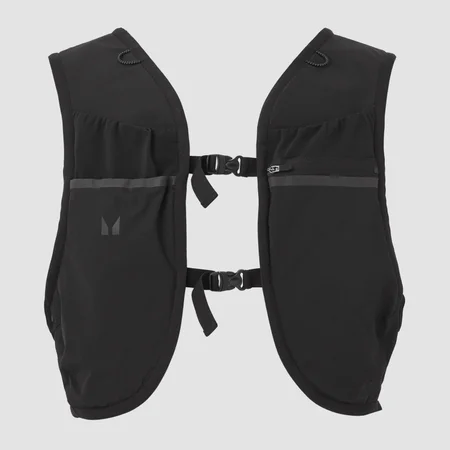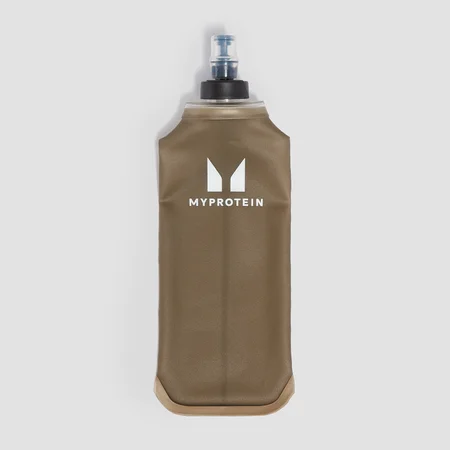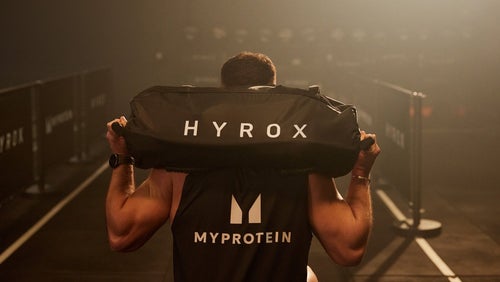Jake Dearden | Hyrox Tips From A Master Trainer
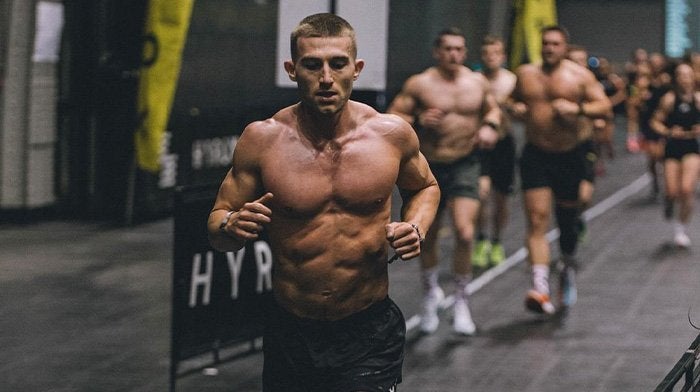
Hyrox has cemented its position as the world’s hottest sporting challenge, with people all over the world signing up to take it on.
If you’re one of many who’s decided to see what all the fuss is about or you’re a competitor who wants to improve their time, we’ve got you covered. With tips from the UK Hyrox Master Trainer and Myprotein ambassador Jake Dearden, you’ll be reaching the top of the competition in no time.
- How to improve your running for Hyrox
- Hyrox workout station instructions & tips
- SkiErg
- Rower
- Sled pull
- Sled push
- Farmers carry
- Wall ball
- Walking lunge
- Recovery tips
How To Improve Your Running For Hyrox
Running takes centre stage in Hyrox, so improvement is always a priority. Here are some tips to make your running the best it can be.
- Regular training: Develop your running speed and efficiency leading up to Hyrox by running at least 2-3 times a week.
- Intervals: Build speed with the incorporation of intervals into your training, on either a treadmill or track.
- Hill runs: Get used to running on fatigued legs by running hills to increase strength and power.
- Strength training: Commit plenty of gym time to working on your legs, as strong leg muscles will help get you through the many challenges of Hyrox.
- Endurance: Hyrox is 60–90-minute event, so get accustomed to running for a long period by completing long runs.
- Rest: Incorporate regular breaks in your training — you can’t keep going at 100% every day.

Hyrox Workout Station Instructions & Tips
While working on your running is crucial, you must make sure that you’re working on Hyrox’s other workouts. Here’s what to do for and how to improve your performance in each.
SkiErg
Instructions:
- Stand tall with your feet shoulder-width, about 18 inches from the flywheel.
- Grab the handles and pull them down to eye-level, with your arms at a 90-degree angle.
- Engage your core and hinge at the hips as you pull the handles downwards.
- After each pull, keep your knees bent and your arms extended (not fully).
- Return to the start position with your arms elevated.
Tips:
- Before starting, set your damper as the preset at the event will be set to 5, 6, or 7 depending on your category.
- Your event pace should be your 5km ski pace when training so make sure to pace yourself at the event.
- Aim for between 30-40 strokes per minute, so be sure to pull strong.
- “Efficiency is key — just breathe, relax and you’ll make it.”

Rower
Instructions:
Catch: Sit on the machine with your back straight, knees and legs almost vertical, and your arms straight, hands grabbing the handle. Drive: Start the movement with your legs, pushing the machine away by driving your feet into the foot stretcher. Use your hips to swing your body back, then pull the handle after your hands pass your knees. Finish: At the end of the movement, the handle should be positioned under your rib cage with your core engaged. Then return to the starting position.
Tips:
- Focus on long, hard pulls of 23-32 strokes per minute. To avoid fatigue, try not to go over this range.
- 1km doesn’t sound like a long distance, but it’s deceptively far. Focus on your breathing through every stroke.
- Maintain your technique: you’ll slow down if you don't keep form so keep your eyes on the chain and fully extend to keep it straight.

Sled Pull
Instructions:
- Maintain a decent distance between you and the sled, facing the handles or the rope.
- Assume a squat-like stance, feet shoulder-width apart and knees bent.
- Straighten your back, tighten your core, and grasp the handles firmly
- Shift your hips back, lean back slightly, and pull with one arm at a time to get into the rhythm of going hand over hand.
- Once the sled is close to you, either push or pull it back for an extra rep.
Tips:
- Use your body weight to your advantage, using it to help you move the sled by leaning back.
- Save your energy by using the two-metre box and walking back with the rope and keep your arms straight to avoid your biceps burning out.
- Chalk and good footwear are your friends — use them to improve your grip.
- 50m is further than it sounds, so pace yourself properly.

Sled Push
Instructions:
- Load the sled with the desired weight.
- Grab the handles with your arms fully extended and incline your body into the sled at a 45-degree angle.
- Drive the sled forwards by extending one leg with your hip.
- Return the sled back by pulling it or push it back for an extra rep.
Tips:
- Proper technique is crucial, whether you opt for a body-through or bent-arm technique.
- Breathe throughout the movement and do not hold your breath.
- Resist the desire to go non-stop and take regular breaks to ensure you have energy left to run after.
- No two tracks are the same, so add a plate in front of the sled to increase the friction and mimic the conditions of a Hyrox event.

Farmers Carry
Instructions:
- Stand between two kettlebells with your feet hip-width apart. Bend down to the grab the handles by hinging at the knees and hips with a flat back.
- Stand tall by engaging your core and extending your hips. The weights should be at your sides with your arms extended fully.
- Take small steps, walking forwards ensuring the kettlebells do not move.
Tips:
- Efficiency is key — reduce fatigue on your forearms and biceps by keeping your arms straight and relaxing your grip on the kettlebells.
- Avoid fatigue in your shoulders by not letting the kettlebells bounce up and down in your hands.
- The quicker you move, the less time you have to hold onto the kettlebells so focus on moving fast.

Wall Ball
Instructions:
- Stand two feet in front of the wall with your feet hip-width apart, holding the ball in your hands.
- Tuck your elbows into your sides and bring the ball up to chest height.
- Squeeze the ball and engage your core — the harder you squeeze, the more the core is engaged.
- Squat down until your thighs align with the floor while keeping the ball at chest height.
- Drive up while throwing the ball at the target area and keep your arms extended. Keep your eyes on the target at all times.
- Catch the ball, return it to chest height, and repeat for as many reps as you can.
Tips:
- Wall balls are a mental game to see how far you can push yourself, even when you think you have nothing left.
- There are a few methods to complete the number of reps needed. You can either try going unbroken, rest for 5-10 seconds and repeating. Or you can split the movement into reps of 15, 20 or 25.

<h2 "Lunge">
Walking Lunge
Instructions:
- Stand with your feet hip-width apart.
- Take a long stride forwards, putting one leg ahead of your torso and keeping the other behind. Your front foot should land flat and remain flat on the ground.
- Lower yourself by bending your knees roughly 90 degrees. Stay upright and keep your core engaged.
- Push off your front foot to return to the starting position.
Tips:
- Avoid unnecessary lactic acid build up by keeping your shoulders relaxed and letting your core and legs do the work.
- Ease the strain on your legs by taking a small step between each lunge.
- Keep an eye on your breathing throughout the movement.
- Build up your single-leg strength by doing movements such as split squats, reverse lunges and heavy walking lunges.
- Strengthen your core, working on muscles such as abductors and adductors to improve your balance and stability.
- Don’t set off too fast — pace yourself at a level you can maintain for the whole 100m.

Recovery Tips
On top of your training, you’ll also want to get your nutrition and recovery strategy in place to give you the best chance of top performance.
Hydration: Drink plenty of water and stay topped up with electrolytes to make sure your body is functioning optimally. Nutrition: Maintain a high-protein diet to provide the nutrients your body needs. Sleep: Get between 7-9 hours of high-quality sleep every night. Don’t overdo it: On event week, take it easy with no intense sessions, instead focusing on simple mobility, weight training, or practicing your form on the workout station movements.

Take Home Message
There’s always room to improve when training for an event like Hyrox. If it’s your running time, your form on the workout challenges, or your recovery strategy, then Jake’s tips should help you on your way. After that, all you need to do is put in the hard work.
FIND MORE TRAINING ARTICLES HERE:
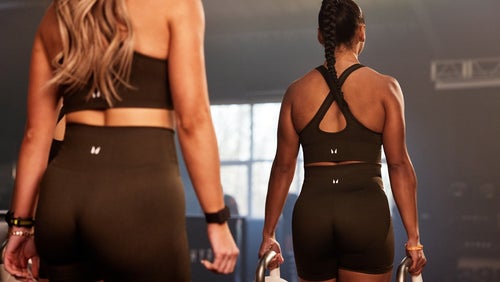
Full Week Of Training As A HYROX Athlete
Here's what a full week looks like for this HYROX champion.

8 Things I Wish I Knew Before My First HYROX Event
It's more than just a race.

